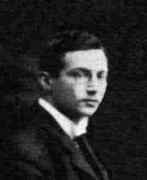Person: Abraham, Max

Max Abraham was a German physicist who worked on electromagnetism and relativity.
Mathematical Profile (Excerpt):
- In 1900 Abraham was appointed as a Privatdozent at Göttingen.
- Abraham had a penchant for being critical and had no hesitation in publicly chastising his colleagues, regardless of their rank or position.
- In 1909 Abraham accepted a post at the University of Illinois in the United States.
- Abraham was professor of rational mechanics at the University of Milan until 1914.
- Abraham's work is almost all related to Maxwell's theory and he wrote a text which was the standard work on electrodynamics in Germany for a long time.
- But one of the most noteworthy features of the text was that in each new edition Abraham saw fit to include not only the latest experimental work but also the latest theoretical contributions, even if these contributions were in dispute.
- Abraham's study of the structure and nature of the electron led him to the idea of the electromagnetic nature of its mass, and consequently to the dependence of the velocity of electromagnetic waves in a gravitational field.
- Abraham was opposed to relativity all his life.
- By 1912 Abraham, who despite his objections was one of those who best understood relativity theory, was prepared to accept that the theory was logically sound.
- Abraham had been a strong believer in the existence of the aether and that an electron was a perfectly rigid sphere with a charge distributed evenly over its surface.
- Many would still agree with Abraham that his version of the world was more in line with common sense.
Born 26 March 1875, Danzig, Germany (now Gdańsk, Poland). Died 16 November 1922, Munich, Germany.
View full biography at MacTutor
Tags relevant for this person:
Origin Germany
Thank you to the contributors under CC BY-SA 4.0! 

- Github:
-

- non-Github:
- @J-J-O'Connor
- @E-F-Robertson
References
Adapted from other CC BY-SA 4.0 Sources:
- O’Connor, John J; Robertson, Edmund F: MacTutor History of Mathematics Archive
